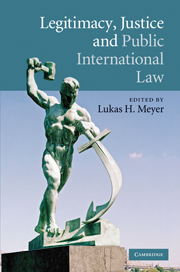Book contents
- Frontmatter
- Contents
- List of contributors
- Acknowledgements
- Introduction: Legitimacy, justice and public international law. Three perspectives on the debate
- 1 The legitimacy of global governance institutions
- 2 Institutionalising global demoi-cracy
- 3 The responsibilities and legitimacy of economic international institutions
- 4 Do international organisations play favourites? An impartialist account
- 5 ‘Victors’ justice'? Historic injustice and the legitimacy of international law
- 6 International law and global justice
- 7 Global justice: Problems of a cosmopolitan account
- 8 The responsibility to protect human rights
- 9 The threat of violence and of new military force as a challenge to international public law
- 10 Forcing a people to be free
- Index
- References
7 - Global justice: Problems of a cosmopolitan account
Published online by Cambridge University Press: 03 May 2010
- Frontmatter
- Contents
- List of contributors
- Acknowledgements
- Introduction: Legitimacy, justice and public international law. Three perspectives on the debate
- 1 The legitimacy of global governance institutions
- 2 Institutionalising global demoi-cracy
- 3 The responsibilities and legitimacy of economic international institutions
- 4 Do international organisations play favourites? An impartialist account
- 5 ‘Victors’ justice'? Historic injustice and the legitimacy of international law
- 6 International law and global justice
- 7 Global justice: Problems of a cosmopolitan account
- 8 The responsibility to protect human rights
- 9 The threat of violence and of new military force as a challenge to international public law
- 10 Forcing a people to be free
- Index
- References
Summary
Introduction
The current debate between cosmopolitans and the defenders of a so-called political conception of justice focuses mainly on two questions: first, what is the site and scope of justice; and second, whether problems such as drastic worldwide economic inequalities and vast differences in life chances between the members of wealthy and poor countries can be tackled only by transcending the traditional nation-state order.
Cosmopolitans argue that issues like world poverty and the severe unfairness of social opportunities amount to problems of justice, moreover global justice, since their moral relevance transcends ethnic as well as state borders. The claim of cosmopolitans concerns the site as well as the scope of justice. World poverty and severe social and economic inequalities are global problems since they cannot be explained and understood apart from the current system of international economic relations and agreements (regulating access to markets, market subsidies, trade barriers, flow of capital, currency exchange conditions, creditworthiness). These agreements and regulations, enacted and controlled by powerful global institutions like the International Monetary Fund, the World Bank and the WTO, do have, cosmopolitans point out, substantial effects on the life prospects and economic opportunities of individuals. The strong impact of these international organisations on the social and economic conditions of persons allows us therefore to assume the existence of a global basic structure.
In addition to this empirical thesis about the global site of justice, cosmopolitans adopt a normative premise concerning the scope of justice.
- Type
- Chapter
- Information
- Legitimacy, Justice and Public International Law , pp. 207 - 231Publisher: Cambridge University PressPrint publication year: 2009



